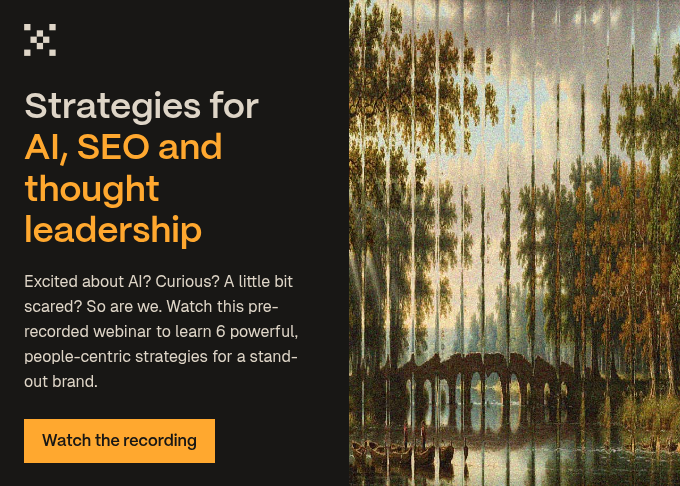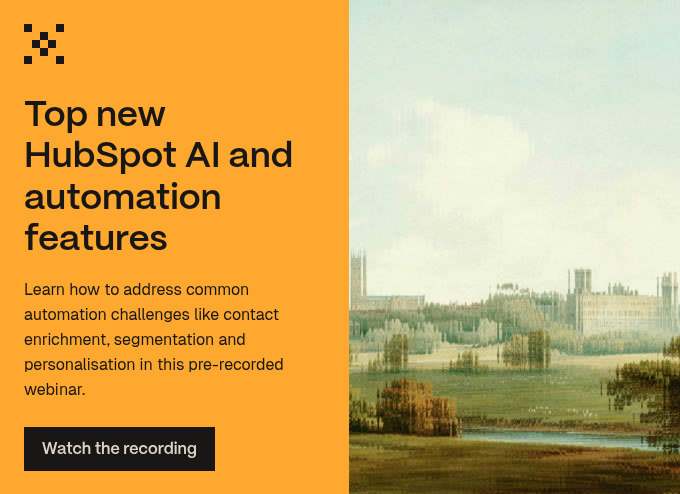Artificial intelligence has a bit of a reputation. Powerful but flawed. Dangerous, yet overhyped. Collectively, we can’t quite decide if the recent wave in AI technology is good or bad, but everyone has an opinion.
We’ve talked a lot about the risks of AI for businesses, but we’d be lying if we weren’t geeking out about it, too. Technology like this will change the world, make no mistake. And we do think the future of AI is a bright one, in the right hands.
Here are some of our favourite examples of innovators using AI for good, including three of our clients who have done incredible work in this field, and who we admire on a personal level.
Grammarly: Eliminating writing mistakes
We start with Grammarly, an AI-driven writing assistant, because it’s close to our hearts. Our copywriting team uses it. Not to write our content for us, you understand, but to help us check for errors and things like tone of voice. Grammarly can tell you if a sentence is too long or wordy. It checks punctuation, spelling and other issues.
It can also parse for plagiarism and AI-generated content, counteracting the wave of “stochastic parroting” that threatens to take over the internet. So, if your beef with AI is ChatGPT-written content, then Grammarly is the antidote. It helps real, human writers do their best work. Of course, you need to be careful how you use its suggestions…
.jpg?width=277&height=196&name=project%20late%20email%20(1).jpg)
Sybil: Detecting lung cancer risk
AI and healthcare go hand-in-hand. Scientists have been finding all sorts of ways that AI deep-learning models can help to detect various diseases, including cancer. Of course, we do still need to be careful as we just illustrated in the Grammarly example; AI has a tendency to be a black box and real-world testing can reveal issues that lab settings do not address, such as this AI model that considered the presence of a ruler in an image as an indicator of cancer. We always suspected the rulers were out to get us…
Nevertheless, huge strides have been made recently in the field of lung cancer, where multiple studies show AI can support early detection of lung cancer risk. Lung cancer is the world’s most deadly cancer, with more than 1.7 million people passing from the disease in 2020.
MIT’s model ‘Sybil’ is the latest algorithm being used to accurately assess cancer risk. It’s not the only one. The deep-learning model can see patterns and make more accurate predictions than human beings. It compares information from scans across thousands of similar images. It sees more than the human eye can detect and can analyse results faster and more accurately than the human mind can.
‘If you detect lung cancer early, the long-term outcome is significantly better. Your five-year survival rate is closer to 70 percent, whereas if you detect it when it’s advanced, the five-year survival rate is just short of 10 percent.’
— Florian Fintelmann, MGCC thoracic interventional radiologist and co-author of the project
Linus Health: detecting early signs of dementia
.jpg?width=662&height=533&name=Untitled%20(15).jpg) Hat tip to Linus Health for the image.
Hat tip to Linus Health for the image.
Linus Health (one of our clients) has used AI to create a digital recall test in order to detect mild cognitive impairment and dementia with the same accuracy as blood biomarkers. One of Linus’ tests costs a fraction of the price of a blood test.
According to their website, Alzheimer’s can be present for 15-20 years before overt symptoms manifest and it’s projected that there will be 139 million cases of dementia by 2050.
The more quickly this can be detected, the better support can be offered to slow symptoms, and patients will enjoy a longer period of independence and an improved quality of life. New drugs that can slow the rate of decline by 27 percent are being developed that are reliant on early detection. That means tests like those being developed by Linus Health are a crucial piece of the puzzle for improving healthcare for those with dementia.
TensorFlow: Teaching machines to detect crop diseases
TensorFlow is an open-source machine-learning platform that’s been making waves for a few years. It was developed by the Google Brain team for internal use in 2015 and was then opened up to the public. The TPU (processing unit) they created is a programmable AI accelerator for the optimised running of AI models. The combination of the machine learning library and this technology has allowed for important developments in crop disease detection.
In one case, farmers have used TensorFlow to detect devastating blight in cassava crops with an app called Nuru, meaning ‘light’. Cassava is eaten by half a billion people daily but is susceptible to a disease that, when advanced to the point a human eye can see it, is too late to save the crop. AI can detect the signs we don’t, saving livelihoods.
(Hey, if you’re interested in making our planet greener, why not sign up for an upcoming webinar, and we’ll plant a tree on your behalf.)
Transparently: Ensuring your money is secure
.jpg?width=1242&height=522&name=Untitled%20(16).jpg) Hat tip to Transparently for the image.
Hat tip to Transparently for the image.
Transparently is the world’s first AI solution for early detection of accounting manipulation and fraud, or as the company puts it, ‘our system predicts the next Enron.’
It provides detection services to keep corporations accountable and check for account manipulation within seconds. This ensures that people can invest their money safely, with the Manipulation Risk Analyzer (MRA) operating from millions of data points to provide an accurate company risk assessment.
We built Transparently’s website, and we think they’re pretty cool, but then we’re nerds for good governance.
Project CORaiL: Protecting our coral reefs
Coral reefs are in danger from rising acidity, over-fishing, warming temperatures and any number of threats to our ocean life.
Restoring reefs depends on accurate data, but this has historically been very difficult to acquire. Until Accenture’s Project CORaiL, that is. It’s an artificial intelligence-powered system for monitoring fish populations that uses smart cameras installed underwater and equipped with a Video Analytics Services Platform (VASP).
Now, we can see the problem, we can solve it.
DigiLab: Making engineering more sustainable
Finally, another client that we admire enormously is digiLab. The company is solving some of the biggest sustainability challenges. Its AI machine learning platform, twinLab, is part of the Ethical AI Database and can be used in engineering to produce a surrogate model of real-world scenarios. digiLab’s leading expertise in uncertainty quantification (UQ) is helping organisations like NATS and the UKAEA make predictions, reduce design cycle times and improve safety.
Technology like this inspires us and makes us think that, yes, AI can be a force for good. If you’re innovating in this AI space, we’d love to hear from you. Get in touch, and we can have a good old geek out or even help get your technology in front of buyers with our award-winning marketing services.

 Posted by
Maddy Leslie
Posted by
Maddy Leslie






-1.jpg?width=400&height=250&name=birmingham-museums-trust-HEEvYhNzpEo-unsplash%20(1)-1.jpg)
